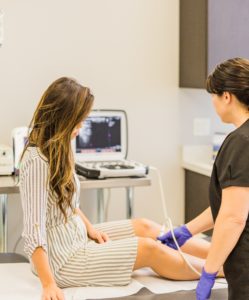What is a venous doppler ultrasound exam? And why is it such an important diagnostic tool in our Houston and Dallas area vein health clinics? Read on to find out!

This is a diagnostic ultrasound test that we use to examine circulation in your large leg veins. Using this exam, we can detect deep vein thrombosis (DVT), as well as other vein health concerns. If you have a leg ulcer, we can learn if its source is in your veins or your arteries.
Like other ultrasounds, our vein ultrasound uses medical imaging tech to helps us see the internal structures in your veins. It generates images uses high-frequency sound waves that bounce off of your vein structures, helping us paint a picture of what's going on in your body.
Diagnostic vein ultrasounds are painless and radiation-free. They don't involve catheters, needles or dye. Overall, we use this test to discover how well your blood is flowing through your veins. It can also help us detect vein health concerns, especially if you're showing signs of vein disease such as leg cramps or edema (swelling.)
When you arrive, you will be brought to the exam room and asked to lie down, removing your clothing below your waist. Then, after a few questions about your medical history and the reason for your exam, the venous doppler will begin. During the 30-45 minute procedure, your technician will apply sound waves to your skin using a transducer. When the waves bounce back, a transducer captures them, creating an image that displays on a screen. From there, we can evaluate how well your veins are functioning, noticing any structural changes or clots.
If your test results are normal, then you can leave the office immediately. But if we notice any abnormalities during your venous doppler, we may order further tests or begin treating your vein disease.
Ideally, we'll see your veins returning blood to your heart without obstructions or delays. Now, when we talk about your leg veins, we're discussing two different groups. First, there are your deep leg veins, lying underneath the muscles in your legs. Then, there are your superficial veins--the ones that become visible through your skin when you have spider veins.
When operating properly, your veins easily deflate, pushing blood up to your heart while working against gravity. Your calf muscles help get this task done, and so do the one-way valves in your veins that close, preventing blood from pooling in your lower limbs.
Of course, sometimes, we detect concerning results during a venous doppler exam. We could detect a superficial blood clot, in the veins right beneath your skin. This could be the result of a recent injury, or a side effect of varicose veins, but we can easily treat this concern.
We may also detect a clot in your deep leg veins, called a DVT. This type of clot is a more serious medical concern because, if the clot breaks free, it can travel to your lungs. There, as a pulmonary embolism, the condition can be fatal, so we'll need to give you immediate, emergency care.
Anyone can develop a DVT at any time, but certain factors increase your risk, including pregnancy, immobility, a long airplane flight, carrying extra weight, having recent surgery, or having a history of prior DVT.
If we're using a venous doppler exam to determine your DVT status, you'll receive your test results before leaving the office. Otherwise, you should receive a call within a few days of the exam, highlighting your results and discussing appropriate next steps.
Like a venous doppler exam, our team of Houston vein specialists use minimally invasive procedures to treat a variety of vein health concerns. After giving you a vein ultrasound to determine your current vein health, we will diagnose any concerns and come up with a treatment plan to restore your optimal blood flow.
Ready to take control of your vein health? Contact our office to scheduleContact our office to scheduleContact our office to schedule a diagnostic ultrasound. Together, we'll learn what's going on inside your veins, and make sure that you're set up for your best health in 2023!

Scheduling
Please contact our dedicated specialists to schedule a consultation today.
2024 Texas Endovascular. All rights reserved. Website Design by Healthcare Success